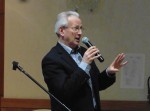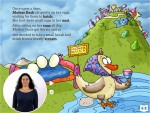Isaac Waldman Jewish Public Library librarian Helen Pinsky, left, and master’s student Alisa Lazear, who is working on the library’s audiobooks collection. (photo by Olga Livshin)
In past centuries, reading aloud was an integral part of family life. People gathered in their parlors to read books to friends and family. In the 20th century, the experience migrated towards radio. When favorite personalities read new novels or classics on the radio, it was a unique pleasure in many communities, especially where access to live entertainment was limited. Then came the TV and the internet. But reading aloud is seeing a comeback – with audiobooks.
The Wall Street Journal ran an article recently about how audiobooks are the fastest-growing sector in the book business today. In 2015, audiobook sales in the United States and Canada increased 21% from the previous year.
The Isaac Waldman Jewish Public Library has reacted to this latest development by expanding their audiobook stacks.
“The modern libraries have to change to keep up with the times,” said Helen Pinsky, Waldman’s head librarian, “but they also stay the same. As ever, they answer the patrons’ curiosity, provide access to information. They are the source of knowledge, whether on their shelves or through their computers. The changes come from different angles. For example, some libraries in the Greater Vancouver area explore novel ways of organizing books: by theme or by the time of publication instead of alphabetically by the author’s name. Such a method is especially convenient for teachers – who could find books on a particular theme grouped in one spot of the library – or for researchers.”
Pinsky also expressed concern about the negative impact of technology, however. With internet search engines, in particular Google, and sites like Wikipedia, people have stopped coming to libraries for information.
“They Google their questions and get a thousand websites as the answers,” she said. “But who could guarantee that the data they find in the first 37 hits is correct? Google is dangerous. It is destroying the value of encyclopedias, while librarians know where to find the right stuff. It is specifically true for the medical or legal areas.”
Of course, there are positive technical innovations, and Pinsky emphasized those, especially the digital formats. After ebooks became a huge segment of publishing in the last decade, and audiobooks followed a few years later, public libraries had to adapt to the new demands, although print books still dominate in the Waldman Library catalogue by a ratio of approximately 20 to one.
“It might be a different ratio for the city libraries,” Pinsky mused. “The exclusive supplier of digital books to Canadian libraries is Overdrive. There were a few smaller companies before but they’ve all gone out of business by now. Unfortunately, Overdrive doesn’t have much interest in the Jewish content, so their selection of Jewish-themed books in both epub format and audio format is rather narrow. They don’t have anything in Hebrew either. It might change in a few years, or publishers might start distributing digital content themselves.”
Still, there are some books available through Overdrive that are of specific interest to a Jewish readership, and the Waldman takes steps to broaden its digital choices.
“Audiobooks are trendy now,” said Alisa Lazear, who is working on the Waldman’s audiobook collection.
Lazear is studying for a master’s degree in library and information studies at the University of British Columbia.
“I need to do 120 hours of professional experience as part of my program. It’s an equivalent of one course,” she explained. “I approached Helen to do my professional experience at the Waldman because I love the library. It was Helen’s idea that my focus should be the audiobook collection. We already have some audiobook CDs, so I concentrated on the online streaming from Overdrive. I had to figure out how to download their books, choose which ones would interest our readers, and integrate them with the main catalogue. Then I had to design flyers to educate the patrons how to use such audiobooks.”
In Lazear’s opinion, the current popularity of audiobooks has to do with people’s chronic shortage of time.
“Audiobooks are great for multitasking,” she said. “You can drive, do chores, work out at a gym, and listen to an audiobook at the same time. A narrator also plays a huge role. He is part of the experience, almost like a friend reading to you. Some narrators have a huge following; people would listen to anything by them.”
Lazear thinks that the new digital formats are accessible across the generational spectrum.
“My young cousins enjoy listening to their favorite audiobooks before bed or in a car,” she said. “Some older people develop visual impairment, and audiobooks might be the only choice for them as a form of reading.”
Regarding this latter point, Lazear created an audiobook program, Coffee & Stories, for the Louis Brier Home and Hospital.
“We had our first meeting on Aug. 7,” she said. “Several people came to the activity room. I brought cookies and selected two different audiobooks. We listened to 10-minute clips from each and then discussed them. It was a very active discussion.”
Olga Livshin is a Vancouver freelance writer. She can be reached at [email protected].




